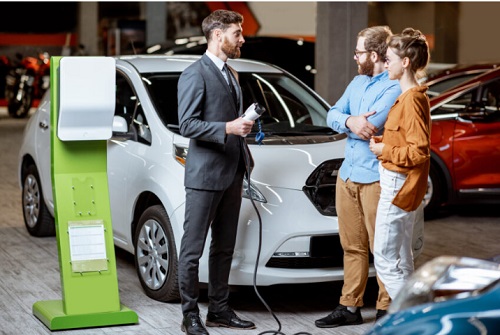Sales of electric vehicles in the UK reached an all-time high in September, despite executives from major automakers expressing concerns to the chancellor about the pressure that government targets are placing on the industry.
According to preliminary figures released by the Society of Motor Manufacturers and Traders (SMMT), a trade group, the British automotive sector sold 56,300 electric cars last month, marking the highest figure ever recorded.
This accounted for 20.5% of total sales during that month being electric vehicles.
Nonetheless, the UK executives of BMW, Ford, and JLR (the maker of Land Rover) were among those who wrote to Rachel Reeves last Friday, intensifying their request for government incentives for EV sales amidst an urgency to comply with the UK’s zero-emission vehicle (ZEV) mandate. This initiative is designed to oversee the phasing out of new petrol and diesel vehicle sales and facilitate the transition to electric vehicles over the next six years.
The car manufacturers, which also included the UK heads of Volkswagen, Mercedes-Benz, Nissan, and Stellantis, stated that “our EV market looks set to miss its target.”
For several months, manufacturers globally have voiced concerns about stagnation in EV demand. On Thursday, Japan’s Toyota announced it would postpone the start of electric vehicle production in the US until 2026, having previously indicated that it would begin at the end of 2025. Ford and Volvo have also been among those delaying their necessary transitions.
According to SMMT data, registrations for new diesel vehicles for private buyers in September saw an increase of around 17.2% compared to the same month last year. In contrast, pure battery electric vehicles rose by only about 3.7%.
The plateau in global sales has compelled UK automakers to engage in what the SMMT described as “unprecedented manufacturer discounting” in order to comply with the ZEV mandate and steer clear of penalties which could reach £15,000 per vehicle for non-compliance. The SMMT reported that manufacturers have reduced the prices of electric vehicles by a total of £2 billion this year.
Mike Hawes, the chief executive of the SMMT, noted that “the cost of that compliance is astronomical and unsustainable.”
However, environmental advocates assert that the ZEV mandate is effective in encouraging automakers to boost their electric vehicle sales. The targets are set to become more stringent each year until 2030, when the sale of new petrol and diesel cars will be prohibited (although some hybrids combining a petrol engine with a smaller battery will still be permitted until 2035).
“The regulation is functioning as intended,” stated Ralph Palmer, the UK electric vehicle and fleets officer for the campaign group Transport & Environment. “The government should not yield to this pressure.”
September and March are crucial periods for car sales in the UK, as new number plates are issued, leading to a surge in buyers. There were 275,000 sales of all new cars in the UK in September, reflecting a 1.1% increase compared to last year, although still a fifth lower than sales in 2019, prior to the pandemic.
Sales of electric cars last month, which will be finalized on Friday morning, were especially important since some manufacturers have waited until the last minute to meet the targets for 2024. Under the ZEV mandate, automakers must achieve a nominal target of 22% of their total sales being purely electric. With the inclusion of September sales, the industry is currently achieving 17.8% for the year.
In their letter to Reeves, the car manufacturers emphasized that “mandates don’t make markets” and expressed a need for subsidies to stimulate demand for electric vehicles.
They stated, “As an industry, we are likely to miss those targets and a significant number of brands face the possibility of either purchasing credits from another company or incurring hefty compliance fees.”
The carmakers requested that the chancellor alleviate various taxes to support the industry, including a reduction in VAT.
Robert Forrester, the chief executive of Vertu Motors, has reached out to ministers advocating for the government to further reduce the annual targets, in line with an EU ban on internal combustion engine sales set for 2035.
“Demand or uptake of EVs is not progressing as swiftly as the regulators had anticipated,” he remarked, citing higher prices and deficiencies in the charging network.
Sue Robinson, chief executive of the National Franchised Dealers Association, a lobby group, also noted that the ZEV mandate is “unintentionally constraining the new car market” and called for a reassessment.
However, the ZEV mandate includes significant provisions that exempt car manufacturers from needing to meet the stated 22% target this year. They can obtain “credits” from other manufacturers who have surpassed their goals, including those like Elon Musk’s Tesla and the Chinese company BYD, both of which exclusively sell electric vehicles in the UK. Manufacturers can also earn credits by “over complying” in subsequent years leading up to the 2030 deadline and by making their petrol vehicles less polluting.
Ben Nelmes, chief executive of New Automotive, a think tank, expressed his belief that the industry as a whole would likely avoid fines for 2024, although certain automakers might have to resort to purchasing credits from their competitors.
UK electric vehicle production has declined as companies face increasing pressure
Overall car production dropped by over 15% compared to the previous year, primarily due to a decrease in exports driven by weak demand, as reported by the Society of Motor Manufacturers and Traders (SMMT).
Output of electric and hybrid vehicles saw a reduction of one-third compared to last year, attributed to dwindling demand in Europe and the reconfiguration of plants for new models.
These figures follow an announcement from Stellantis, the manufacturer of Vauxhall, indicating it would shut down its Luton van manufacturing facility, partly as a result of regulations aimed at accelerating the shift to electric vehicles in the UK.
Additionally, Ford disclosed last week that it plans to eliminate 800 jobs in the UK over the next three years due to challenging market conditions, including heightened competition and reduced demand for electric vehicles (EVs).
Mike Hawes, chief executive of the SMMT, stated, “These are alarming times for the automotive sector, with substantial investments in facilities and new zero-emission products facing intense scrutiny.”
He mentioned that global demand for EVs has diminished, while in the UK, manufacturers are dealing with “the strictest targets and the most accelerated timeline” without the necessary incentives to encourage customer demand.
Despite the decrease in EV production in October, the sales of electric cars in the UK have been on the rise.
In October, they represented one in five cars registered, although industry insiders claim this is largely due to unsustainable price reductions.
A growing dispute exists between the government and the industry regarding the phase-out of new petrol and diesel cars over the coming years.
Under the UK’s zero emissions vehicle (ZEV) mandate, manufacturers are currently obligated to sell a specific percentage of cars and vans that produce zero emissions before the 2030 prohibition on new petrol and diesel car sales.
In 2024, EVs must constitute 22% of a carmaker’s sales, and 10% of van sales. This requirement is set to increase.
For each sale that exceeds the limits set by the mandate, companies are required to pay a £15,000 penalty – although they may also purchase “credits” from firms that can adhere to these limits.
Business Secretary Jonathan Reynolds announced that a “fast track” consultation will be conducted to review how the EV targets are enforced.
However, he reiterated Labour’s promise to adhere to the 2030 ban on new petrol and diesel vehicle sales.
A spokesperson for the Department for Business and Trade stated that the government recognizes the industry’s need for “certainty and stability” and is investing £2 billion in vehicle manufacturing along with over £300 million to facilitate the adoption of electric vehicles.
“We are continuously collaborating with the sector to ensure a successful transition,” the spokesperson added.
The closure of Stellantis’ Luton facility will jeopardize 1,100 jobs.
Mark Noble, the former UK manufacturing lead for Stellantis, expressed his “disappointment, shock, and anger” regarding the closure plans to the BBC.
He noted that the decision to close the plant was influenced by “several external factors,” including uncertainties regarding Brexit tariffs and the ZEV mandate.
He mentioned that issues for Stellantis’ UK facilities in Luton and Ellesmere Port “began with Brexit” due to the “significant uncertainty” it caused.
“When you have two UK plants that export over 80% of their production, the confusion about tariffs and lack of clarity significantly affected those two facilities.”
He asserted that concerning the ZEV mandate, the government “needs to determine whether this is a tax, a £6 billion burden on car manufacturers, or a requirement to transition to greener practices.”
“They must make it feasible for car manufacturers to achieve these targets,” he emphasized.
He also remarked that obstacles to the widespread adoption of EVs persist, including insufficient charging infrastructure.
“If everyone were to purchase an electric vehicle tomorrow, I don’t see how we would charge them,” he stated.
However, Vicky Read, the chief executive of the EV charging industry group Charge UK, informed the BBC that a charger “is being set up every 25 minutes.”
The expansion of charging stations relies on private sector investment, making discussions about weakening electric vehicle targets “deeply worrying,” she noted.
According to government data, there are over 71,000 public charging points in the UK, with an average of 57 being added each day.
James Richardson, a government adviser and the director of analysis for the Climate Change Committee, mentioned to the BBC that established car manufacturers risk being surpassed by new entrants.
“Companies often underestimate how swiftly these markets can evolve, leading them to fall behind,” he remarked.
He added that electric sales targets are “significant in sending a message to companies that they must act quickly, or they will lose market share to competitors.”
In November, one out of every four vehicles sold in the UK was electric, based on industry statistics, although the surge in new registrations was largely due to significant discounts.
For the 11th month in a row, electric car sales have risen, as indicated by the Society of Motor Manufacturers and Traders (SMMT), with automakers striving to meet stringent targets.
The SMMT reported that manufacturers provided substantial discounts totaling approximately £4 billion on electric vehicles (EVs).
Nonetheless, companies are expected to fall short of government sales objectives for EVs this year and will likely face hefty payments to comply with regulations.
Mike Hawes, the SMMT’s chief executive, noted that manufacturers are pouring “unprecedented levels” of investment into electric vehicles and “spending billions on attractive offers.”
However, he remarked, “Such incentives cannot continue – the industry cannot achieve the UK’s leading ambitions on its own.”
New registrations of electric cars deviated from a general decline in other vehicle categories.
While most of the new car demand stemmed from fleet sales to businesses, this sector also experienced an overall sales drop.
Sales of new petrol vehicles decreased by over 17%, diesel car sales fell by more than 10%, and hybrids and plug-in hybrids saw declines of over 3% and 1% respectively.
The government has pledged to meet with automakers to discuss EV sales targets, asserting that the targets “will not be weakened” while mentioning “flexibilities” will be considered.
Manufacturers have expressed that they cannot meet the existing targets, which require EV sales to account for 22% of cars sold in 2024, without additional incentives for customers.
Currently, this figure stands at 18.7%, and they believe it could reach 19% by year-end.
However, this still makes them liable to purchase credits from other manufacturers who have accumulated credits for selling EVs.
Many of these companies operate in China or produce vehicles there—such as Tesla, a U.S. company—but other manufacturers may have credits as well.
Automakers have historically argued against subsidizing Chinese companies by acquiring credits.
Earlier this month, both Ford and Stellantis, which owns Vauxhall, announced job reductions, partly attributing them to the EV sales targets.
However, both companies have previously expressed concerns regarding their future in the UK due to additional factors.
Ford shut down its Bridgend facility in 2020, eliminating 1,644 jobs and citing Covid as one reason.
Vauxhall’s prior owner, PSA Group, suggested in 2019 that Brexit posed a threat to its Luton production facility.
On the whole, UK-based firms have been embracing the shift to electric, with JLR’s Jaguar gaining significant attention for its recent rebranding as an electric-only manufacturer.
The UK automotive sector is undergoing a transformative phase characterized by a strong push to increase electric car manufacturing.
Recent data from the Society of Motor Manufacturers and Traders (SMMT) indicates a 7.6% decrease in car production during the first half of the year, with factories assembling 416,074 units, which is 34,094 less than the same timeframe last year.
This decline is primarily attributed to manufacturers reconfiguring production lines to accommodate electrified vehicles, reflecting a considerable £23.7 billion investment made in the industry last year.
Despite a decline in overall production, the focus on electric vehicle manufacturing remains robust.
In the first half of the year, production of electrified vehicles, which includes battery electric, plug-in hybrid, and hybrid models, also fell by 7.6%, mirroring the overall trend.
Nevertheless, these vehicles still account for a significant share of the output, representing 37.8% of total production, which remains unchanged from the previous year.
While domestic car production for the UK market increased by 17.7%, totaling 106,157 units, it was not enough to offset a 13.9% decrease in exports.
The export market holds great importance for the UK, with over 70% of produced cars intended for international markets.
The European Union is the largest market, comprising 55.4% of all exports in the first half of the year, which amounts to 171,745 units.
Other major markets include the US, China, Turkey, and Australia, which together account for 29.4% of exports.
The industry is calling for enhanced government support
Mike Hawes, SMMT Chief Executive, pointed out the swift pace of the UK’s transition to electric vehicles, referring to it as a potential growth driver for the British economy.
He highlighted the necessity of government commitments to gigafactories, decarbonized energy supplies, and an expedited planning process.
These initiatives are essential to improve competitiveness and maintain jobs within the sector.
The industry outlook anticipates a 9.3% decline in light vehicle production this year, with a recovery projected to exceed 1.1 million units by 2028, where more than half are expected to be zero-emission vehicles.
According to the Society of Motor Manufacturers and Traders (SMMT), the UK has the potential to produce over nine million zero-emission vehicles by the year 2035, provided that there is adequate government support. This projection exceeds previous estimates by approximately 600,000 units and is expected to generate substantial economic impact, with a projected value surpassing £290 billion.
In its strategic initiative titled “Vision 2035: Ready to Grow,” SMMT outlines a comprehensive plan aimed at fostering the domestic electric vehicle (EV) market. This vision emphasizes the necessity of transforming the automotive industry through reskilling the workforce, advancing the provision of clean energy solutions, and ensuring that global trade practices remain fair and free. By aligning these goals with the government’s new industrial strategy and the Automotive Sector Plan, SMMT aims to secure a prosperous future for the UK automotive industry, which is crucial for the overall health of the national economy.
Despite the various challenges currently facing the sector, the UK is making significant progress in ramping up electric vehicle production. The combination of strategic investments, robust government backing, and an unwavering focus on innovation and sustainability positions the UK as a potential leader in the global shift towards electric mobility. This leadership not only promises to drive economic growth but also to deliver long-term environmental benefits that support a sustainable future for subsequent generations.



